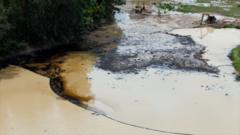A recent investigation showcases claims of widespread oil pollution linked to Colombia's state-owned oil company, Ecopetrol, revealing a troubling history of environmental neglect.
Whistleblower Exposes Ecopetrol's Extensive Oil Pollution Crisis

Whistleblower Exposes Ecopetrol's Extensive Oil Pollution Crisis
A revelation from a former employee highlights alarming pollution records by Colombia's Ecopetrol, raising environmental concerns.
In a groundbreaking investigative piece, former Ecopetrol employee Andrés Olarte has linked the Colombian energy giant to extensive oil contamination, affecting hundreds of sites across the nation. Leaked documentation, comprising over 800 pollution records from 1989 to 2018, has raised serious concerns over the company’s failure to adequately report environmental damages. Industry opponents point to a pattern of negligence that threatens local ecosystems, including aquatic life along the Magdalena River, essential for millions of Colombians.
Ecopetrol, which operates Colombia's primary oil refinery near Barrancabermeja, stands accused of polluting vital water sources and biodiverse wetlands. Despite the company's assertions of compliance with local laws and sustainable practices, residents such as fishing community leader Yuly Velásquez report a decline in wildlife, including dead manatees and other endangered species, attributing these issues directly to oil contamination.
Olarte, who left the company three years ago, cites a systemic effort to conceal environmental hazards. His findings suggest that a significant portion of pollution incidents, some unresolved for over a decade, were categorized as "known only to Ecopetrol." Further corroborated data points to numerous oil spills reported post-2019, contradicting Ecopetrol's claims of effective cleanup and management.
The investigation reveals a disturbing climate of intimidation. Both Olarte and Velásquez have claimed receipt of threats related to their environmental advocacy work, highlighting the risks faced by those challenging powerful corporations in Colombia. Despite denials from Ecopetrol’s former CEO Felipe Bayón, experts suggest a troubling nexus between security forces linked to paramilitary groups and the oil industry, creating an atmosphere of fear around environmental dissent.
As Colombia grapples with both environmental and security issues, including longstanding conflicts with armed groups, communities find themselves at a crossroads of dire economic and ecological consequences, forcing powerful considerations on the future of energy production in the nation. Olarte’s commitment to environmental justice remains steadfast, highlighting the urgent need for accountability from one of Latin America’s largest oil companies.
While Ecopetrol maintains its stance on sustainability and minimizes its environmental impacts, the growing body of evidence presented by whistleblowers like Olarte indicates a crisis that demands immediate attention from regulators and civil society alike. Environmental defenders continue to face formidable challenges, underscoring the necessity for safeguarding both human rights and ecological integrity in Colombia.
Ecopetrol, which operates Colombia's primary oil refinery near Barrancabermeja, stands accused of polluting vital water sources and biodiverse wetlands. Despite the company's assertions of compliance with local laws and sustainable practices, residents such as fishing community leader Yuly Velásquez report a decline in wildlife, including dead manatees and other endangered species, attributing these issues directly to oil contamination.
Olarte, who left the company three years ago, cites a systemic effort to conceal environmental hazards. His findings suggest that a significant portion of pollution incidents, some unresolved for over a decade, were categorized as "known only to Ecopetrol." Further corroborated data points to numerous oil spills reported post-2019, contradicting Ecopetrol's claims of effective cleanup and management.
The investigation reveals a disturbing climate of intimidation. Both Olarte and Velásquez have claimed receipt of threats related to their environmental advocacy work, highlighting the risks faced by those challenging powerful corporations in Colombia. Despite denials from Ecopetrol’s former CEO Felipe Bayón, experts suggest a troubling nexus between security forces linked to paramilitary groups and the oil industry, creating an atmosphere of fear around environmental dissent.
As Colombia grapples with both environmental and security issues, including longstanding conflicts with armed groups, communities find themselves at a crossroads of dire economic and ecological consequences, forcing powerful considerations on the future of energy production in the nation. Olarte’s commitment to environmental justice remains steadfast, highlighting the urgent need for accountability from one of Latin America’s largest oil companies.
While Ecopetrol maintains its stance on sustainability and minimizes its environmental impacts, the growing body of evidence presented by whistleblowers like Olarte indicates a crisis that demands immediate attention from regulators and civil society alike. Environmental defenders continue to face formidable challenges, underscoring the necessity for safeguarding both human rights and ecological integrity in Colombia.




















